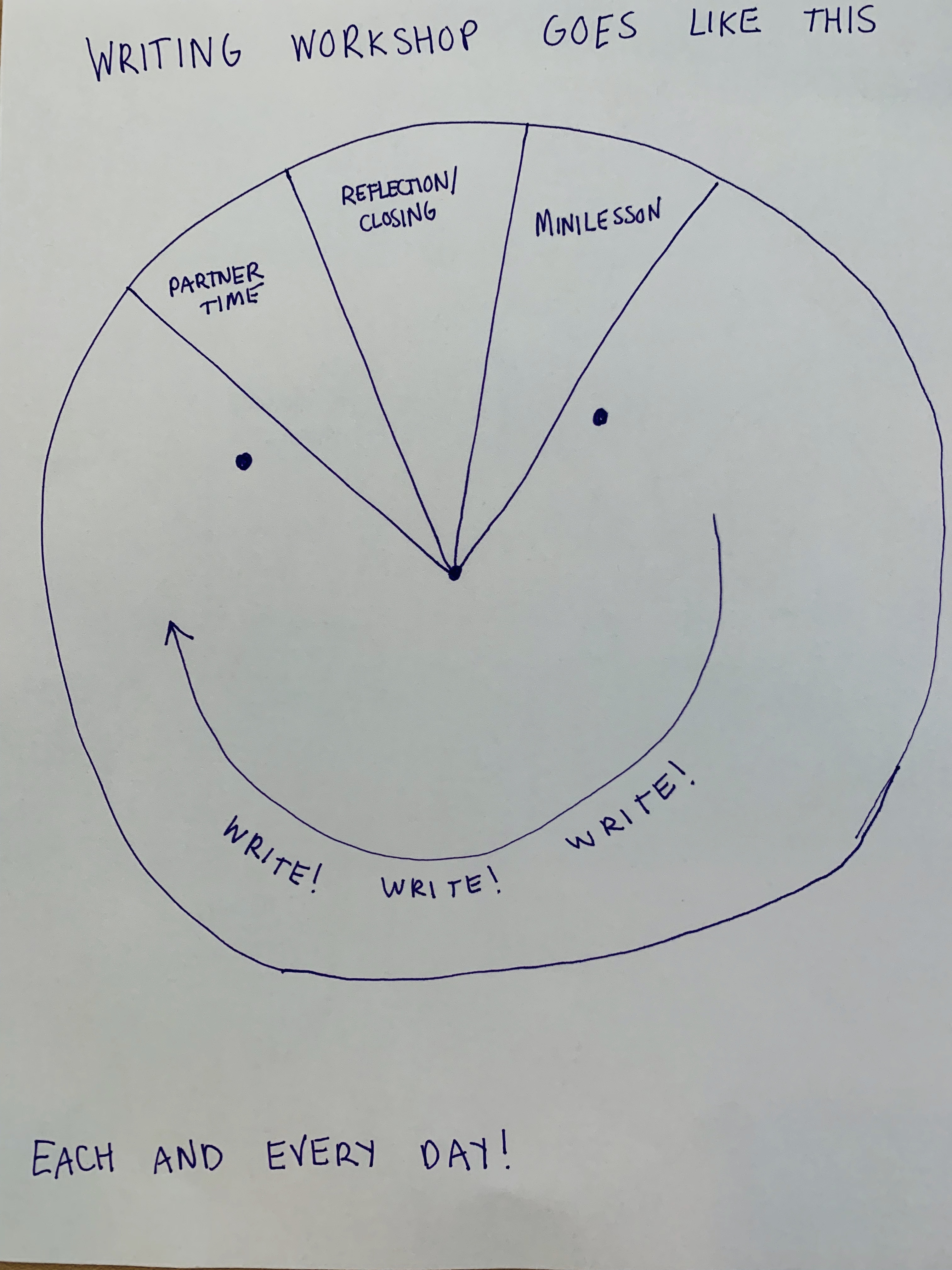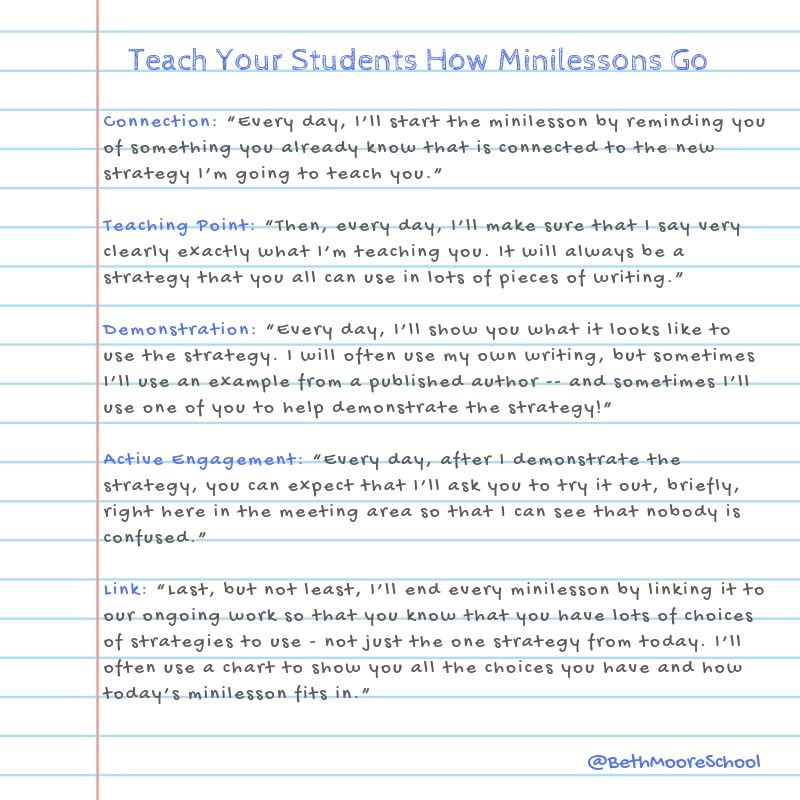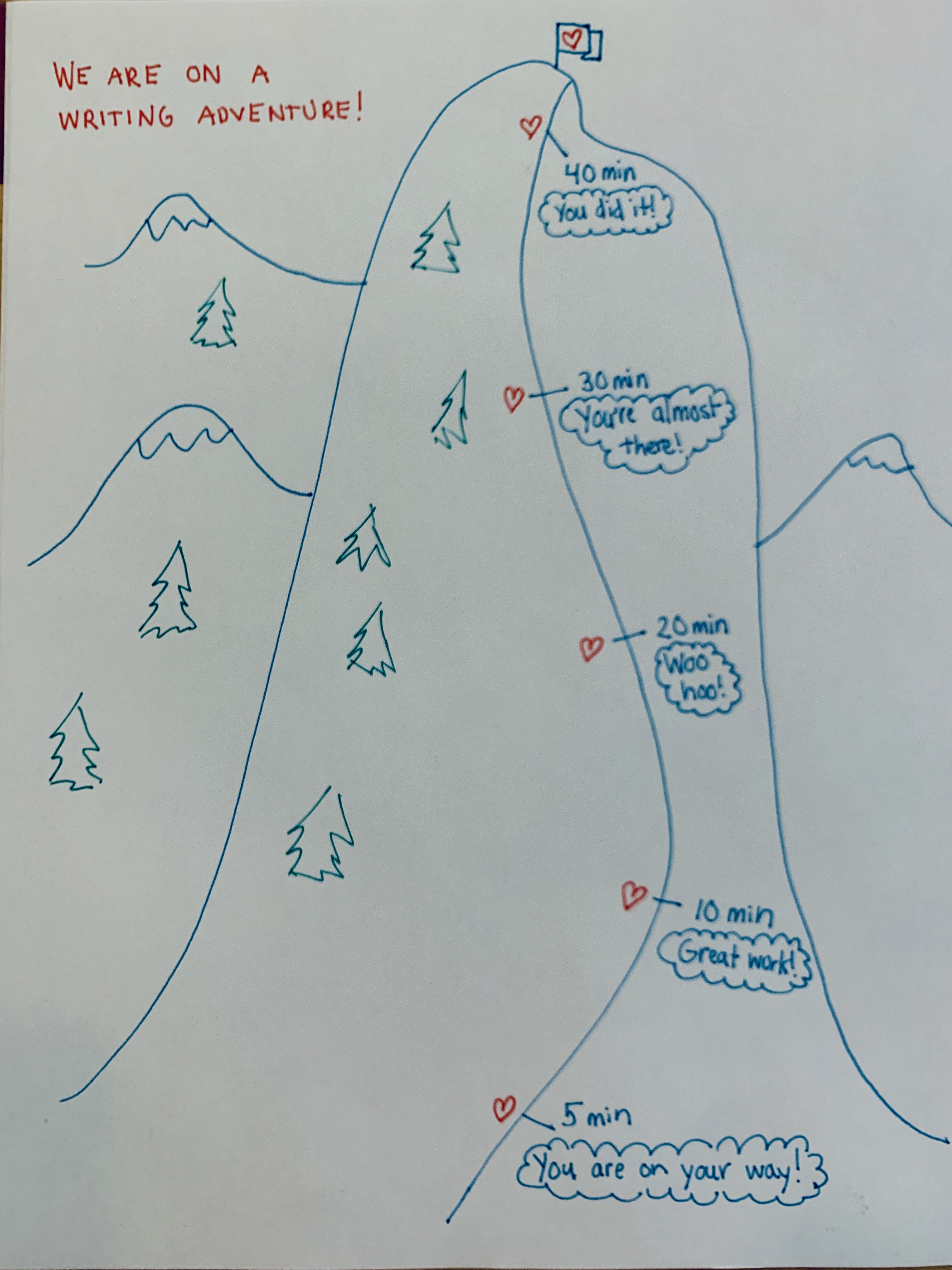
If you are six years old, or seven, or twelve, or thirteen, (or forty), it’s a challenge to focus on doing your best writing if you’re constantly wondering what will happen next. Your mind is constantly distracted by thinking–Who will you be sitting next to? When will anybody ever read the thing you are writing? How much time will you have to work on this?
Predictability and consistency make it possible for students to stop worrying about what might happen next, so they can concentrate on more important things–like what to write about today and how to bring their stories to life. Consistency also allows students to operate independently in writing workshop, rather than waiting for the teacher to oversee every step.
In this post, I’ll describe how four parts of writing workshop can foster independence: Minilessons, Independent Writing Time, Partner Time, and the Reflection/Closing.

Independence During the Minilessons
Many teachers find it helpful to teach students explicitly how minilessons go — and eventually older students can even learn how to independently teach each other minilessons during partner time.

When students know what to expect during the minilesson, they become less dependent on teacher reminders on how to come to the meeting area, how to turn and talk, how to stay focused, or how to transition to independent writing. All of the routines involved in the minilesson stay the same, so student can do things on their own, without needed new directions every day.
Independent Writing Time
There is a poem, by Eve Merriam, that I often hold in mind when thinking about writing workshop.
There go the grownups
To the store.
Subway rush,
To the office,
Traffic crush;
Hurry, scurry,
Worry, flurry.
No wonder
Grownups
Don’t grow up
Any more.
It takes a lot
Of slow
To grow.
If your students are new to writing workshop, they may be unaccustomed to having a stretch of time to fill with independent writing, and you might find that in the beginning, they seem to run out of steam after five or ten minutes. This is where consistency and routine can support you. If you continue to provide time each day, students have the opportunity to build their stamina and independence. Try setting a timer on Day 1 for a small amount of time you know your students will be successful with – perhaps five minutes. Then you can grow their stamina, just adding a few minutes at a time, day after day until you’ve reached your goal of thirty or forty minutes of sustained independent writing time.

Independence During Partner Work
Established partnerships allows students to help each other, rather than waiting on an adult to come around. Partners make it possible for students to support each other and keep each other going.
There’s no need to wait to get writing partners going. There are no “prerequisites” to being a writing partner, no such thing as “not ready.” Kids can start out by simply sharing and talking with whomever they already sit next to, and later you can assign formal, longer-lasting partnerships.
Consistency is key. Think about how nervous you feel sometimes about sharing your writing–especially if it is somebody you don’t know very well. Keeping students with the same partner for a period of time helps them develop a working relationship and some trust so that they can think less about “who is this person” and more about “how can I improve my writing.”
During your conferring, you might teach the partnerships one thing to do at a time, eventually building up a list of things they know how to do together without needing adult assistance. With younger kids, you might start by simply teaching them how to sit shoulder-to-shoulder with just one piece of writing in the middle. (I always encourage both writers to physically touch the page, so that they are both focused on that piece of work). They can learn to take turns reading. Teach them to read clearly and expressively and ask each other to speak up or reread when necessary. Then you might move on to teaching them how to give explicit compliments or suggestions, or you might teach particular questions to ask each other, such as “What are you really trying to show?” or “What’s the most important part of your story?”
Eventually all the partnerships will have a whole repertoire of things they can choose to do together, rather than waiting to be told what to do. This helps them to operate with complete independence, rather than simply following directions.
Reflection Time to Foster Independence
The last few minutes of writing workshop are the perfect opportunity to share, reflect, or self-assess, and set fresh goals for work on a frequent, routine basis. Self-assessment and reflection foster ownership and independence.
Sometimes, an “Author’s Chair” can prompt a student or whole class to become very reflective, using the writing was shared as a springboard for great conversations about the strengths and next steps of not only the one piece of writing, but for everybody’s writing.
You might also simply pose a question about writing and give students space to have a whole class conversation to brainstorm ideas and strategies.
Or perhaps, students bring their writing to the meeting area, and you could guide them to use a checklist or anchor chart to reread and reflect on their work to identify which strategies they’ve relied on most, and which strategies they might try next.
In all these examples, students are looking to each other, rather than the teacher alone, for feedback and ideas to support their independent writing. When students can generate their own feedback, they are truly independent learners.
On Monday, August 12, my colleagues and I will host a Twitter chat on the topic of nurturing independence right from the start of the school year. We hope you’ll join us. In the meantime, consider this questions, which will be included in the chat:
Some say consistency & predictability are at the heart of fostering trust & independence. What are your best tricks for being consistent in the structures of minilessons, conferring, small group work, & share sessions?
Giveaway Information:

- This giveaway is for a copy of No More “I’m Done!” (Link to: https://www.stenhouse.com/content/no-more-im-done) and No More “How Long Does It Have to Be?”(Link to https://www.stenhouse.com/content/no-more-%E2%80%9Chow-long-does-it-have-be%E2%80%9D) by Jennifer Jacobson. Thanks to Stenhouse Publishers (Link to: https://www.stenhouse.com) for donating a copy of each of these books — one book for a primary educator and one book for a secondary educator. (You must have a U.S. mailing address to win a print copy of this book.)
- For a chance to win this copy of No More “I’m Done!” or No More “How Long Does It Have to Be?”, please leave a comment about this or any blog post in this blog series by Sunday, August 11th at 6:00 p.m. EDT. BE SURE TO WRITE DOWN THE GRADE LEVEL OR GRADE BAND YOU TEACH SO WE CAN PUT YOU IN THE RUNNING FOR THE BOOK THAT MATCHES THE GRADE BAND YOU TEACH. Betsy Hubbard will use a random number generator to pick the winner’s commenter number. His/her name will be announced in the ICYMI blog post for this series on Monday, August 11th.
- Please leave a valid e-mail address when you post your comment so Betsy can contact you to obtain your mailing address if you win. From there, our contact at Stenhouse will ship the book to you. (NOTE: Your e-mail address will not be published online if you leave it in the e-mail field only.)
- If you are the winner of the book, Betsy will email you with the subject line of TWO WRITING TEACHERS – NO MORE BOOKS within five days of receipt. A new winner will be chosen if a response isn’t received within five days of the giveaway announcement.


Thanks for the reminders. I have always found the TC minilesson model challenging, especially since we only have at best 37 minutes of actual class time. Any tips on how to handle all the minilesson components while honoring independent work time? Also, I got the impression that the mini-lessons were all about strategies. Can they also be about craft, text structures/features? Or is that not an accurate distinction I am making? Thanks.
LikeLike
Last summer I read Joy Write by Fletcher and these posts are the perfect complement to his work. I love that you have posted this series right at the beginning of my school year. It helps to have these ideas in mind from the beginning. (I teach 3rd grade).
LikeLike
Great advice/reminder of how routine and consistency are important in order to develop independent writers. Looking forward to starting up writers workshop with my second graders in a just a few weeks.
LikeLike
Thank you for the list of “think aloud” questions associated with each part of the minilesson. Our district is doing a full rollout of the workshop model and this will be helpful to frame the “why” behind each component. Will be sharing this tool!
LikeLike
This was a great post to read before starting another year of writing with my 3rd graders! I was looking for new ideas for writer’s notebooks and came across this. Love the visual of what writer’s workshop looks like!
LikeLike
I’m so grateful for the explicit examples of how I can structure the writing workshop experience in my classroom. I plan on borrowing the ‘expectations’ chart which will actually be MY guide on how to let my lesson flow. I can’t believe how generous the educators that comprise the team of Two Writing Teachers are in sharing these wonderful and brilliant ideas with us. Thank you so very much.
LikeLike
I’ve bookmarked this post to review and to share as we head back tomorrow and our second graders come next week. Thank you for this review to jump start our thinking about this year’s writing workshop!
LikeLike
I completely agree that students need to be explicitly taught the routines and expectations. The theme of consistency was repeated throughout this blog. Consistency is key in helping students become independent.
LikeLike
Dee teaches 3rd grade.
LikeLike
Love the way you outlined the steps that will be easy for experienced teachers to review their practice and beginning teachers to start out successfully. I see often how teachers are trying to be creative. It’s so exhausting and often doesn’t get the results they hope for. I remember how Lucy Calkins always compares the workshop to a pottery workshop and I see it my mind, calm, uncluttered, simple to bring out the creativity in the potters. thanks for the reminders.
LikeLike
I always “wait” to start partnerships until kids know each other… This year, I’ll try starting partnerships right away. I teach fourth grade.
LikeLike
I LOVE the poem you shared. Thank you for reminders on “Reflection Time.” SO important to remember the power of reflection! TK-8
LikeLike
I appreciated the poem included in the post. The words “it takes a lot of slow to grow” keeps bouncing around my head. Often as educators we are in a hurry to get students where they need to be without acknowledging that it takes time and practice. I have shared the line with a colleague with the intention that we will remind each other to take “a lot of slow to grow.”
The majority of my teaching time this year will be in grades 5-8.
LikeLike
I think your simple trick of having both partners touch the piece of writing they are sharing so they are focused can be really helpful with my Kindergartners.
LikeLike
I plan to join the Twitter chat on Monday. The ideas presented here are great, can’t wait to implement.
LikeLike
Love these reminders as we start to think about starting the new year! I think the idea of conferencing into partnerships is awesome and something I will try!
I teach second grade!
LikeLike
I love the idea of gradually increasing independent writing time. For my reluctant writers, this is going to reduce anxiety so much.
LikeLike
9th grade English 🙂
LikeLike
I continue to struggle with developing my students’ independence in writing workshop. I think I’m structured with routines and expectations, but perhaps I’m not explicit enough. I need to teach into it more, but I usually feel bogged down by the curriculum map, so I don’t spend enough time building routines. I know it’s time well-spent, though.
LikeLike
I teach grade 2.
LikeLike